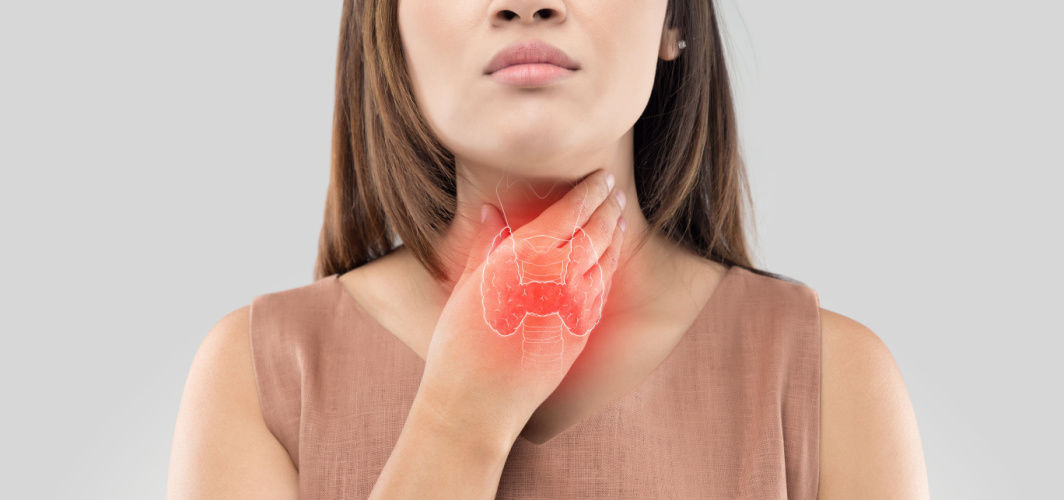General Health
Thyroid Disease: Know The Difference Between Hypothyroidism And Hyperthyroidism
5 min read
By Apollo 24|7, Published on - 12 June 2023, Updated on - 14 June 2023
Share this article
0
0 like

Thyroid disorders are a common health concern for millions of people worldwide. These disorders can impact the function of almost every system in your body. There are two primary types of thyroid disorders - hypothyroidism and hyperthyroidism. While these conditions may seem similar, they affect the body in different ways. It's important to understand the differences between hypothyroidism and hyperthyroidism to help identify symptoms and seek appropriate treatment. Let's take a closer look at each condition.
What Is Thyroid Disease?
The thyroid is a small, butterfly-shaped gland present at the base of your neck. It plays a critical role in regulating the body's metabolism by producing two hormones: triiodothyronine (T3) and tetraiodothyronine (T4). These hormones help break down fats, carbohydrates, and proteins to provide energy for the body. They also help regulate blood pressure, heart rate, and body temperature.
The pituitary gland in the brain controls the production of T3 and T4 by producing thyroid-stimulating hormone (TSH). When any part of this system malfunctions, the thyroid may produce too much or too little of these hormones, resulting in two different conditions; hyperthyroidism and hypothyroidism. Each of these conditions has its own set of symptoms, and it's important to understand the differences between the two to seek proper treatment.
What is Hypothyroidism?
Also known as underactive thyroid, hypothyroidism is a condition where the thyroid gland doesn't produce enough hormones to function properly. This results in a slowing down of the body's metabolism, causing weight gain. If left untreated, hypothyroidism can worsen over time , leading to a severe complication known as myxedema or thyroid coma.
What is Hyperthyroidism?
Often referred to as overactive thyroid, hyperthyroidism is a condition in which the body produces an excessive amount of thyroid hormones, specifically triiodothyronine and thyroxine. This increase in hormone production leads to a faster metabolism, which can cause rapid weight loss.
How To Differentiate Between The Types Of Thyroid Disease?
Hyperthyroidism Vs Hypothyroidism: Symptoms
|
Hypothyroidism Symptoms |
Hyperthyroidism Symptoms |
|
Weight gain |
Weight loss |
|
Cold intolerance |
Heat intolerance |
|
Decreased sweating |
Increased sweating |
|
Irregular and heavy periods |
Short and light periods |
|
Slow heart rate |
Racing heart |
|
Constipation |
Diarrhoea |
|
Brittle nails |
Nail thickening and flaking |
|
Muscle or joint pain |
Muscle weakness |
|
Depression and irritability |
Nervousness and anxiety |
|
Puffy face |
Puffy or bulging eyes |
A few symptoms are common in both conditions like fatigue, hair loss, and insomnia. The presence of these symptoms does not confirm thyroid disease as the doctors would recommend certain tests to confirm the diagnosis.
Hyperthyroidism Diagnosis Vs Hypothyroidism Diagnosis
Diagnosis of both hypothyroidism and hyperthyroidism begins with a simple blood test called thyroid profile, which measures three types of hormones; T3, T4 & TSH.
- TSH (Thyroid-stimulating hormone): A high TSH result indicates that the pituitary gland is in overdrive, possibly attempting to compensate for an underactive thyroid gland. On the other hand, a low TSH result means that there are abnormally high levels of thyroid hormones in your blood, which may indicate hyperthyroidism.
- T3 & T4 (free thyroxine and triiodothyronine): Low levels of these hormones suggest hypothyroidism, while high levels indicate hyperthyroidism.
Your doctor will likely ask you to fast before the test to obtain the most accurate result.
Hyperthyroidism Treatment Vs Hypothyroidism Treatment
Treatment for hyperthyroidism and hypothyroidism differs significantly. The goal of hypothyroidism treatment is to bring your hormone levels up, while hyperthyroidism treatment aims to lower the same.
Hypothyroidism Treatment
Levothyroxine is the standard medication used in hypothyroidism treatment. It helps in replacing missing thyroxine hormones in your body. While occasional dosage adjustments may be required, most people will need to continue taking this medication for the rest of their lives.
Hyperthyroidism Treatment
Hyperthyroid treatment will vary according to several factors, such as age, physical health, and severity. Anti-thyroid medications work by preventing the thyroid gland from producing too many hormones. These medications do not damage the thyroid gland. Sometimes, beta-blockers are also prescribed to minimise the impact of too much thyroid hormone on your body like heart palpitations. In some cases, surgical removal of the thyroid gland may be necessary.
Takeaway
Thyroid disorders have distinct symptoms that, if unnoticed, can impact your quality of life, and some can even be life-threatening. However, with accurate diagnosis and timely medications, those with a thyroid disorder can manage their condition efficiently. If you are experiencing the symptoms of a thyroid disorder or feel that your current treatment plan is inadequate, then it is best to speak to your healthcare provider.
FAQs
Q. What are the common symptoms of thyroid disease?
A: few typical symptoms are changes in weight, hair loss, mood fluctuations, sensitivity to cold or heat, changes in heart rate, and dry skin.
Q. What is the treatment for thyroid disorders?
A: Treatment for thyroid disorders depends on the specific diagnosis. Hypothyroidism is typically treated with synthetic thyroid hormone replacement medication, while hyperthyroidism may involve medications to reduce thyroid hormone production or radioactive iodine therapy.
Q. How are thyroid conditions identified?
A: The most frequent tests include imaging exams like an ultrasound or a radioactive iodine uptake scan, as well as blood tests to detect thyroid hormone levels (TSH, T3, T4).
Q. How can TSH help in thyroid problem diagnosis?
A: Thyroid-stimulating hormone (TSH) is frequently the first test carried out to evaluate thyroid function. Abnormal TSH levels may indicate hypothyroidism or hyperthyroidism.
Q. How can an ultrasound aid in the diagnosis of thyroid conditions?
A: An ultrasound creates pictures of the thyroid gland using sound waves. It can assist in locating nodules, gland enlargement, or other abnormalities.
Medically reviewed by Dr Sonia Bhatt.
General Health
Leave Comment
Recommended for you

General Health
All You Need To Know About Azithromycin
Azithromycin is a versatile antibiotic used against different bacterial infections like sinusitis, pneumonia, and throat infections. Emphasizing responsible usage, the article covers proper dosage, precautions for allergies and medical history, and potential side effects. Explore the importance of adhering to prescribed dosages, completing the full course of treatment, and avoiding self-medication.

General Health
Importance of Early Diagnosis in Healthcare
Discover why early diagnosis in healthcare is vital. Learn about its impact on treatment outcomes and patient well-being.

General Health
How To Treat Chickenpox At Home?
Learn effective home remedies and treatments to manage chickenpox symptoms and speed up recovery. Discover the latest guidelines, lifestyle factors and new technologies to alleviate discomfort and promote healing.
Subscribe
Sign up for our free Health Library Daily Newsletter
Get doctor-approved health tips, news, and more.
Visual Stories

Science-backed Home Remedies for Burns and Blisters
Tap to continue exploring
Recommended for you

General Health
All You Need To Know About Azithromycin
Azithromycin is a versatile antibiotic used against different bacterial infections like sinusitis, pneumonia, and throat infections. Emphasizing responsible usage, the article covers proper dosage, precautions for allergies and medical history, and potential side effects. Explore the importance of adhering to prescribed dosages, completing the full course of treatment, and avoiding self-medication.

General Health
Importance of Early Diagnosis in Healthcare
Discover why early diagnosis in healthcare is vital. Learn about its impact on treatment outcomes and patient well-being.

General Health
How To Treat Chickenpox At Home?
Learn effective home remedies and treatments to manage chickenpox symptoms and speed up recovery. Discover the latest guidelines, lifestyle factors and new technologies to alleviate discomfort and promote healing.